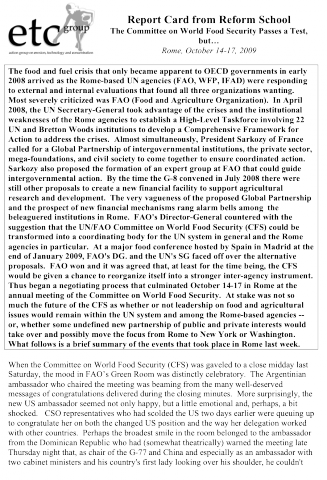Submitted by ETC Staff on
The food and fuel crisis that only became apparent to OECD governments in early 2008 arrived as the Rome-based UN agencies (FAO, WFP, IFAD) were responding to external and internal evaluations that found all three organizations wanting. Most severely criticized was FAO (Food and Agriculture Organization).
In April 2008, the UN Secretary-General took advantage of the crises and the institutional weaknesses of the Rome agencies to establish a High-Level Taskforce involving 22 UN and Bretton Woods institutions to develop a Comprehensive Framework for Action to address the crises. Almost simultaneously, President Sarkozy of France called for a Global Partnership of intergovernmental institutions, the private sector, mega-foundations, and civil society to come together to ensure coordinated action. Sarkozy also proposed the formation of an expert group at FAO that could guide intergovernmental action. By the time the G-8 convened in July 2008 there were still other proposals to create a new financial facility to support agricultural research and development. The very vagueness of the proposed Global Partnership and the prospect of new financial mechanisms rang alarm bells among the beleaguered institutions in Rome. FAO's Director-General countered with the suggestion that the UN/FAO Committee on World Food Security (CFS) could be transformed into a coordinating body for the UN system in general and the Rome agencies in particular. At a major food conference hosted by Spain in Madrid at the end of January 2009, FAO's DG. and the UN's SG faced off over the alternative proposals. FAO won and it was agreed that, at least for the time being, the CFS would be given a chance to reorganize itself into a stronger inter-agency instrument. Thus began a negotiating process that culminated October 14-17 in Rome at the annual meeting of the Committee on World Food Security. At stake was not so much the future of the CFS as whether or not leadership on food and agricultural issues would remain within the UN system and among the Rome-based agencies -- or, whether some undefined new partnership of public and private interests would take over and possibly move the focus from Rome to New York or Washington. What follows is a brief summary of the events that took place in Rome last week.
| Attachment | Size |
|---|---|
| 133.77 KB |

